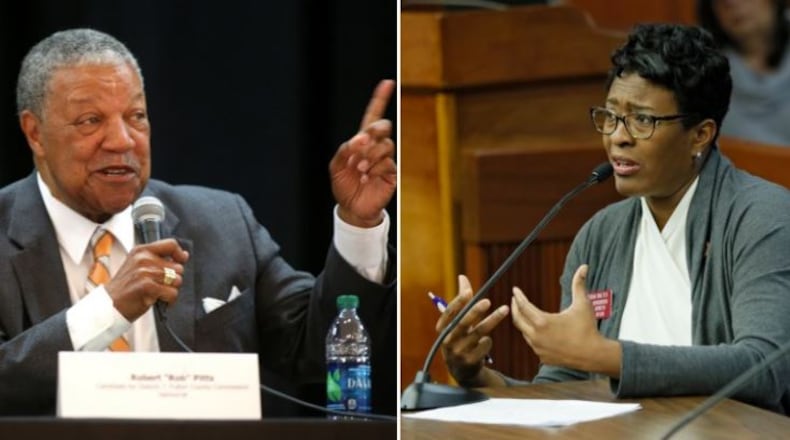When Robb Pitts or Keisha Waites is sworn in as the next Fulton County commission chair in December, he or she will hold a different job from the one John Eaves filled for the past decade.
It will be different, too, than the leader of any other county government in the state.
Over the next year, as the new city of South Fulton takes on the last of Fulton County's municipal responsibilities by taking over Fulton's police department and other services, it will fundamentally change a government that once filled potholes, opened parks and approved land-use decisions on behalf of local residents.
The county government will still run libraries, collect taxes and manage the criminal justice system, among other duties. But many of the day-to-day services that residents go to government for will be outside its purview.
Bob Ellis, vice chairman of the county commission, said that should free up more time for Pitts or Waites to focus on big-picture issues that were sometimes hard for their predecessors to focus on. Ellis has been filling the chair’s role since late summer, when Eaves resigned to run for mayor of Atlanta.
Having to focus on local services for some residents “naturally takes management band-width away,” Ellis said. He said he expects government to be stronger and more focused.
“Some pretty meaty and weighty services fall exclusively upon counties to deliver,” he said. “If the commission is free of zoning, of fire, of police, there’s a significant amount of time for improving all the other things. It’s going to make the county more effective and stronger.”
Waites, a former state representative, said she wants to be a "consensus builder and a bridge builder" if she is elected. She said Fulton County should not operate in silos, and she wants to use her position as a bully pulpit to help solve issues like a broken property tax system and high HIV rates. Selling and marketing Fulton County is part of the role of its leader, she said.
Pitts, a former county commissioner and former president of the Atlanta city council, said he wants Fulton County government to have a bigger role, and get more recognition, in the region. He envisions his role “sort of like a conductor.”
“The county government should have a seat at the table,” he said. “I’ll coordinate and lead the effort.”
Eaves thinks Atlanta’s new mayor will be best positioned to serve as a regional voice, but urged the new county chair to step into the role if it is left vacant. Fulton’s government leader is on regional transportation, water and economic development boards, among others, and Eaves said that person is well positioned to bring people together.
Charlotte Nash, the chair of Gwinnett County, said she thinks the new Fulton leader could serve as an effective mediator, bringing people together to find solutions for problems it no longer faces.
“Not being directly involved may give them a unique position to help build consensus,” she said.
Bill Edwards, the South Fulton mayor who was once a member of the Fulton commission, said the new chair must continue to work with other governments — with the cities in Fulton County, and with neighboring county leaders. He mentioned Grady Memorial Hospital, which Fulton and DeKalb counties both fund.
Taking on more of a regional role would be good for Fulton residents, Edwards said — ultimately, the chair's job can be best described as a convener, a sentiment Eaves and Ellis echoed.
“You need to be a collaborative leader, someone who can really go and build relationships,” Ellis said. “So much stuff we do really is intertwined with city, state and other elected officers. …It needs a facilitator and a collaborator to bring it together. That role needs to continue and it needs to get stronger.”
Parts of the commission chair’s job are fairly rote, and include presiding over meetings and signing documents. But there are other opportunities for a local leader that stem from Fulton’s unique place in metro Atlanta and the state.
The chair’s role is a part-time job, but Clint Mueller, the legislative director for the Association County Commissioners of Georgia, suggested making it a full-time position might allow the new leader to play a bigger role in metro-wide or state Chambers of Commerce, or the Atlanta Regional Commission.
The Fulton chair “plays an important role in addressing key regional issues that cross political lines,” Doug Hooker, the ARC’s executive director, said in a statement.
Although the city of Atlanta has the name recognition, the county leader has a regional geography that spans much of the metro area — and a budget to match.
“Fulton County is the heart of the metro Atlanta region,” Mueller said. “They’re a very central player on all the discussions going on in the region. It’s the kind of thing the Fulton County chair should be more involved with.”
MYAJC.COM: REAL JOURNALISM. REAL LOCAL IMPACT.
The AJC's Arielle Kass keeps you updated on the latest happenings in Fulton County government and politics. You'll find more on myAJC.com, including these stories:
Never miss a minute of what's happening in Fulton politics. Subscribe to myAJC.com.
In other Fulton news:
About the Author
Keep Reading
The Latest
Featured





